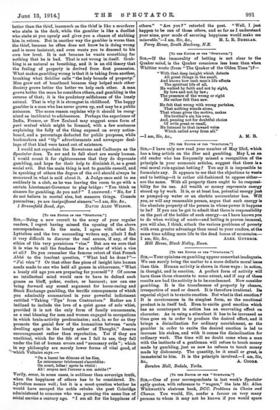[To rue Eorros or um .Srac-rAxon_"] Siu,—Being a new recruit
to the army of your regular readers, I regret having missed the opening of the above correspondence. In the main, I agree with what Dr. Lyttelton and the two succeeding writers say, albeit I find it very difficult to discover the real source, if any, of the ethics of this very pernicious "vice." But are we sure that it is wise to call the fondness for a rubber of whist a vice at all ? Do you remember the famous retort of that French Abbe to the insolent question, "What had he done ?"— " J'ai vecu "? Or that other fine piece of insight into human needs made to one who held all games in abhorrence, "What a lonely old age you are preparing for yourself " ? Of course no intellectual mind would care to have to defend such games as bluff, poker, euchre, or baccarat; nor can one bring forward any sound argument for horse-racing and Stock Exchange gambling, the terrific consequences of which you admirably summarized in your powerful indictment entitled "Taking 'Tips' from Contractors." Rather am I inClined to include the love of a quiet game of solo whist, provided it is not the only form of family amusements, as a real blessing for men and women engaged in occupations in which brain-activity predominates ; and, in so far as they promote the genial flow of the humanities between "souls dwelling apart in the lonely aether of Thought," deserve encouragement rather than reprobation. Yet if they are unethical, which for the life of me I fail to see, they fall under the list of human errors and "necessary evils "; which in my philosophy are merely lower forms of vital good, of which Voltaire says
On a banni lee demons at les fees, Le raisonneur tristement s'accredite: On court, helm ! spree is verite: Ah! croyez moi l'erreur a son merit° !"
'Verily, error, in some cases, is sublimer than sovereign truth, when the happiness of others has to be considered. Dr. Lyttelton means well; but it is a moot question whether he would have escaped the noble rebuke the poet Coleridge administered to someone who was pursuing the same line of social service a century ago. "I am all for the happiness of others." "Are you P" retorted the poet. "Well, I just happen to be one of those others, and so far as I understand your aims, your mode of securing happiness would make me miserable."—I am, Sir, Ise., M. L. R. BRESLI.R. Percy House, South Hackney, KB.










































 Previous page
Previous page